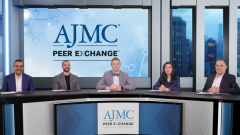
Beyond the Itch: The Full Spectrum of AD Symptoms and Their Impact on Patients
Panelists discuss how atopic dermatitis (AD) extends far beyond pruritus to include pain, sleep disturbances, psychosocial stigma, and quality-of-life impacts that affect patients’ work, school, and daily functioning regardless of disease severity.
Content above is prompted by the following:
AD extends far beyond the hallmark symptom of pruritus, encompassing a complex array of physical and psychosocial manifestations that significantly impact patient quality of life. Clinical presentations vary in patients with darker skin tones, appearing as deep purple, maroon, or other pigmentation changes rather than typical erythema. Patients experience pain, stinging, burning sensations, and frequent secondary bacterial infections, particularly recurrent staphylococcal infections that complicate treatment regimens and increase health care utilization.
Sleep disturbances represent a critical yet often underestimated consequence of AD, affecting not only patients but also their families and caregivers. These disruptions particularly impact pediatric development and family dynamics, creating cascading effects on academic performance, work productivity, and social functioning. Patients develop “topical fatigue” from complex skin care regimens and may become recalcitrant to topical therapies over time, leading to treatment frustration and reduced adherence to management plans.
The psychosocial burden of AD creates substantial stigma and impacts daily functioning across all age groups. Patients report being subjected to ridicule at school or workplace discrimination, leading to social isolation and reduced self-esteem. The economic burden includes direct costs of medications and indirect costs from work or school absenteeism. Patients describe feeling “shackled” to their topical medications, unable to take true vacations without packing extensive skin care supplies, highlighting how the condition restricts life activities beyond clinical measurements.
Newsletter
Stay ahead of policy, cost, and value—subscribe to AJMC for expert insights at the intersection of clinical care and health economics.









